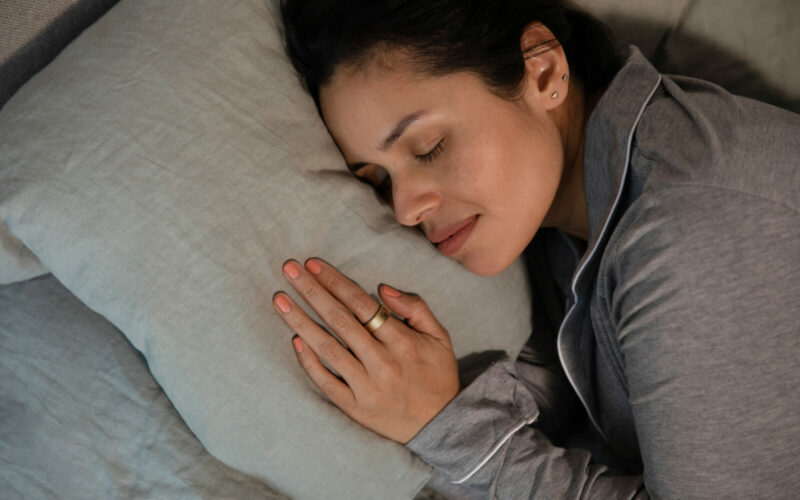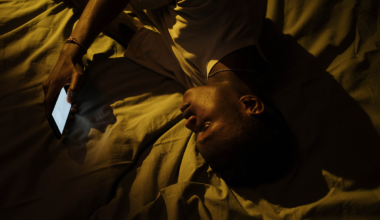Not getting enough sleep can leave you in a foul mood the next day—that’s no surprise. What fewer people realize? Even nights of so-so or seemingly adequate sleep may lead to mental health problems over time. Awakening during the night or not spending enough time in the deep or REM sleep stages can prevent your brain from getting the full benefits of sleep. Seeing detailed data about your slumber can help you understand its impact on your mood and mental functioning, and make changes to improve your sleep quality.
That’s why Talkspace has partnered with ŌURA, the maker of the smart ring that collects biometric information on your sleep, activity, heart health and more through sensors wrapped subtly around your finger. After wearing an Oura Ring to bed you’ll awake to a report on what your body did while you were catching zzzs. Your heart rate, blood oxygen level, body temperature, and more will all be displayed in the Oura app.
But the data with the most to say about your mental health is your sleep score, a number that indicates the quality of the rest you received, and the detailed chart that reveals how much time you spent in each sleep cycle and how often you awoke during the night. You can tag your data (“stress” “late workout” “big dinner” “meditation”) to create a record of what may be causing sleep struggles or improvements.
All this data is useful on its own but if you’re working to improve your mental well-being you’ll want to talk it over with your mental health provider. So it’s great news that Oura now offers a Share Report feature that makes it easy to export your sleep data and share it with your Talkspace therapist or psychiatric provider through the secure Talkspace app.
How Sleep Stats Can Inform Your Care
What will you and your Talkspace provider learn from your sleep data that’s relevant to your mental health? For starters, you might think you’re getting seven hours of shut-eye (the minimum recommended amount for healthy adults), but are actually awakening throughout the night and not even realizing it.
Lack of sleep can increase negative thoughts and decrease positive ones, lead to tiredness and irritability, and reduce our ability to focus and concentrate on tasks.
Talkspace therapist Bisma Anwar, LMHC
So if the Oura Ring reveals that you’re only truly asleep for six hours a night, that can inform how you and your provider approach some of the challenges you’re facing. How would your conflicts with your partner play out differently if you were well-rested? Could the first step in addressing your lack of motivation at work be better sleep hygiene?
Or, you might be clocking enough hours of sleep but learn from Oura that too little of them are spent in the deep sleep or REM stages. According to Oura, “Deep sleep, also known as slow-wave sleep, is the body’s most rejuvenating sleep stage. During deep sleep . . your body gets busy repairing and restoring many systems, from your brain to your muscles.” The Sleep Foundation says, “Experts believe that this stage is critical to restorative sleep . . there is evidence that deep sleep contributes to insightful thinking.”
The REM (aka Rapid Eye Movement) sleep stage, when you experience the most active and vivid dreams, is believed to be vital to memory, learning, and creativity. According to Oura, “REM plays an incredibly important role in both emotional health and learning” and “getting enough REM sleep may help mitigate potentially negative emotional reactions.”
If your sleep data shows that your deep sleep or REM stages are too short, you and your provider can discuss causes and solutions. Insufficient deep or REM sleep may be due to stress, or lifestyle factors like drinking alcohol or eating too close to bedtime. You can work with your provider on sleep hygiene, stress management, or anxiety-reduction techniques with the goal of improving sleep quality.
When Poor Sleep is a Warning Sign
While lack of sleep and poor sleep quality can cause mental health symptoms, it can also be caused by them
The sleep-mental health connection is what’s called bidirectional. Not only does inadequate sleep contribute to poor mental health, it can also be a sign of a mental health condition—depressive symptoms and anxiety can [also] lead to reduced sleep.
Talkspace psychiatrist Dr. Dion Metzger, MD
Having access to your detailed sleep data can help your provider understand if you might need a different type of treatment or benefit from medication. It can also indicate if a medication is working or might need to be adjusted.
A Special Offer From Talkspace and Oura
Between now and the end of September, current Talkspace members will receive $40 off of the purchase of any Oura Ring and one complimentary month of subscription to the Oura app. Talkspace will offer $100 off the first month of Talkspace services to Oura for use by Oura members who pay out-of-pocket.
To redeem this offer, visit https://ouraring.com/discount/talkspace. The discount will be automatically applied at checkout.
The Oura ring is a great tool that can make tracking sleep much easier and it can provide more detailed data around sleep. But even without it, people can keep a sleep log so that the therapist and client can track sleep patterns over a period of time. With personal sleep data we can partner with you to connect sleep to mental health issues and work toward solutions.
Talkspace therapist Bisma Anwar, LMHC
Talkspace articles are written by experienced mental health-wellness contributors; they are grounded in scientific research and evidence-based practices. Articles are extensively reviewed by our team of clinical experts (therapists and psychiatrists of various specialties) to ensure content is accurate and on par with current industry standards.
Our goal at Talkspace is to provide the most up-to-date, valuable, and objective information on mental health-related topics in order to help readers make informed decisions.
Articles contain trusted third-party sources that are either directly linked to in the text or listed at the bottom to take readers directly to the source.




